情态动词can和could 用法详解
can与could的用法详解及情态动词有关习题

c a n与c o u l d的用法详解及情态动词有关习题Company Document number:WTUT-WT88Y-W8BBGB-BWYTT-19998can与could的用法详解一、表示能力(1)表示现在的能力,用can:My sister can drive. 我妹妹会开车。
Everyone here can speak English. 这儿人人会说英语。
(2)表示将来的能力,通常不用can或could,而用be able to的将来时态:I’ll be able to speak French in another few months. 再过几个月我就会讲法语了。
One day people will be able to go to the moon on holiday. 总有一天人们可以到月球上去度假。
但是,若表示现在决定将来是否有能力做某事,则可用 can:Can you come to the party tomorrow 你明天能来参加我们的聚会吗(3)表示过去的能力,有时可用could,有时不能用could,具体应注意以下几点:①若表示过去一般的能力(即想做某事就随时可做某事的能力),可用could:Could you speak English then 那时候你会说英语吗②若表示过去的特定能力(即在过去特定场合做某事的能力),则不能用could,而用w as (were) able to do sth,或用 managed to do sth,或用 succeeded in doing sth 等。
He studied hard and was able to pass the exam. 他学习很努力,所以考试能及格。
At last he succeeded in solving the problem. 他终于把那个问题解决了。
【注】could 不用来表示过去特定能力通常只限于肯定句,否定句或疑问句中,它则可以表示过去特定的能力:I managed to find the street, but I couldn’t find her house. 我想法找到了那条街,但没找到她的房子。
情态动词can和could的用法
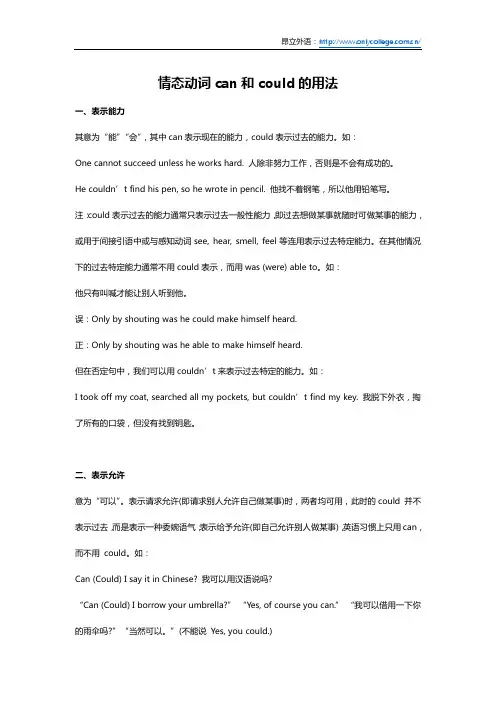
情态动词can和could的用法一、表示能力其意为“能”“会”,其中can表示现在的能力,could表示过去的能力。
如:One cannot succeed unless he works hard. 人除非努力工作,否则是不会有成功的。
He couldn’t find his pen, so he wrote in pencil. 他找不着钢笔,所以他用铅笔写。
注:could表示过去的能力通常只表示过去一般性能力,即过去想做某事就随时可做某事的能力,或用于间接引语中或与感知动词see, hear, smell, feel等连用表示过去特定能力。
在其他情况下的过去特定能力通常不用could表示,而用was (were) able to。
如:他只有叫喊才能让别人听到他。
误:Only by shouting was he could make himself heard.正:Only by shouting was he able to make himself heard.但在否定句中,我们可以用couldn’t来表示过去特定的能力。
如:I took off my coat, searched all my pockets, but couldn’t find my key. 我脱下外衣,掏了所有的口袋,但没有找到钥匙。
二、表示允许意为“可以”。
表示请求允许(即请求别人允许自己做某事)时,两者均可用,此时的could 并不表示过去,而是表示一种委婉语气;表示给予允许(即自己允许别人做某事),英语习惯上只用can,而不用could。
如:Can (Could) I say it in Chinese? 我可以用汉语说吗?“Can (Could) I borrow your umbrella?” “Yes, of course you can.” “我可以借用一下你的雨伞吗?”“当然可以。
”(不能说Yes, you could.)注:以上说的是针对现在或将来情况而言的,若谈的是过去情况,则过去could只用于表示过去一般性允许(即表示某人随时都可以做某事),而不表示特定的允许(即表示在过去某一特定情况下允许进行某一特定的活动),遇此情况需换成其他表达。
情态动词can和could的用法
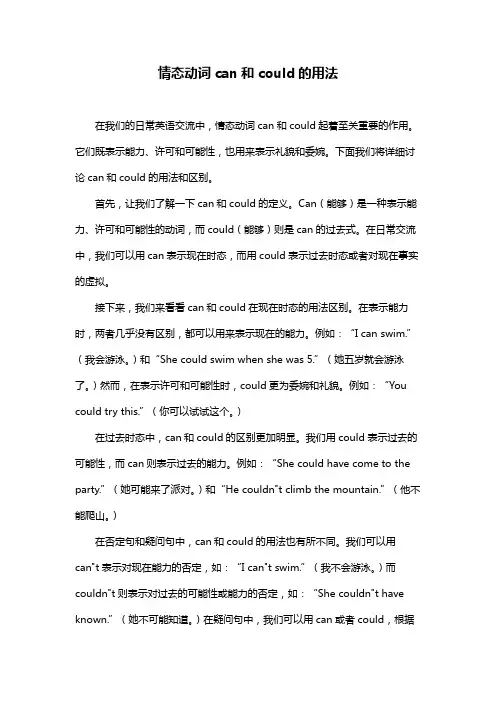
情态动词can和could的用法在我们的日常英语交流中,情态动词can和could起着至关重要的作用。
它们既表示能力、许可和可能性,也用来表示礼貌和委婉。
下面我们将详细讨论can和could的用法和区别。
首先,让我们了解一下can和could的定义。
Can(能够)是一种表示能力、许可和可能性的动词,而could(能够)则是can的过去式。
在日常交流中,我们可以用can表示现在时态,而用could表示过去时态或者对现在事实的虚拟。
接下来,我们来看看can和could在现在时态的用法区别。
在表示能力时,两者几乎没有区别,都可以用来表示现在的能力。
例如:“I can swim.”(我会游泳。
)和“She could swim when she was 5.”(她五岁就会游泳了。
)然而,在表示许可和可能性时,could更为委婉和礼貌。
例如:“You could try this.”(你可以试试这个。
)在过去时态中,can和could的区别更加明显。
我们用could表示过去的可能性,而can则表示过去的能力。
例如:“She could have come to the party.”(她可能来了派对。
)和“He couldn"t climb the mountain.”(他不能爬山。
)在否定句和疑问句中,can和could的用法也有所不同。
我们可以用can"t表示对现在能力的否定,如:“I can"t swim.”(我不会游泳。
)而couldn"t则表示对过去的可能性或能力的否定,如:“She couldn"t have known.”(她不可能知道。
)在疑问句中,我们可以用can或者could,根据语境选择。
例如:“Can you help me?”(你能帮我吗?)或者:“Could you help me?”(你能帮我吗?)最后,我们来看看一些常见的错误和实用建议。
can与could 用法解析
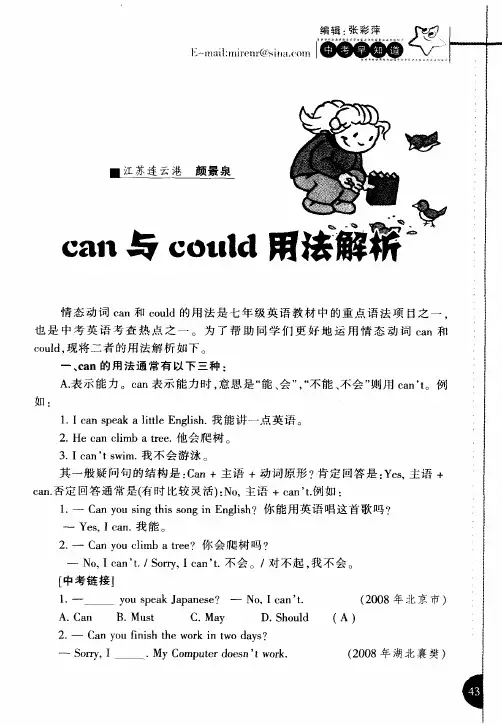
. My Computer doesn’t work.
—
—
(2008年 湖北 襄 樊 )
编 辑 :张 彩 萍
会 ”。 表 示 过 去 不 能 时 要 用 couldn’t。 例 如 :
1.The girl could play the piano at the age of 5.那 个 小 女 孩 5岁 时 就 会 弹 钢
Excuse m e,
you — — — — which is the way to the bank? (could,
—
—
tell me)
【中考链 接 】1.- Excuse me,could you please help me carry the heavy box?
一
.
(2005年 河 南 省 )
1.一 Could you give me a hand? 你 能 助 我一 臂 之 力 吗 ?
一 Yes,I can./Certainly.当然 可 以 。
2.一 Could you help me carry these books to the classroom? 你 能 帮我 把 这 些
书搬 到教 室 里 吗 ?
一 Sorry,I can’t.对 不 起 ,我 不 能 。
3.一 Could you tell me how to use the computer?请 告 诉 我 怎样 使 用 电 脑 好 吗 ?
一 Yes,please.好 的 ,请 吧 。
C.could表 示 可 能 性或 提 建 议 。could表示 可 能 性 时 ,意思 是 “能 、可 能 ”;表 示 劝 告 、提建 议 时 ,意 思 是 “应 该 ”。例 如 :
情态动词can与could用法归纳
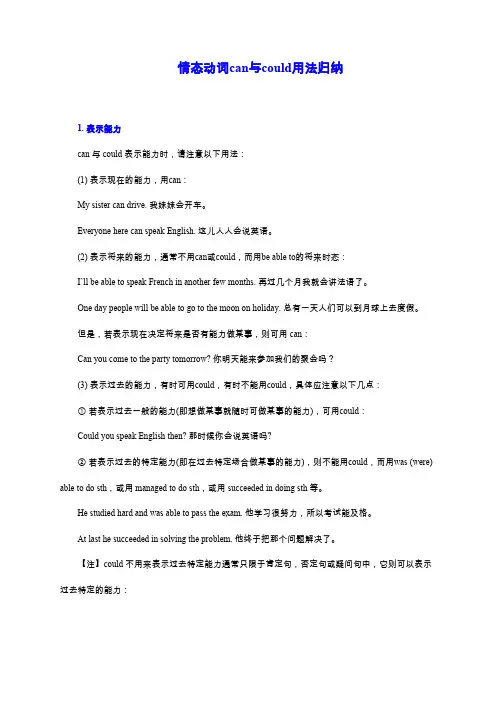
情态动词c an与c ould用法归纳1. 表示能力can 与could 表示能力时,请注意以下用法:(1) 表示现在的能力,用c an:My sister can drive. 我妹妹会开车。
Everyone here can speak English. 这儿人人会说英语。
(2) 表示将来的能力,通常不用c an或c ould,而用b e able to的将来时态:I’ll be able to speak French in another few months. 再过几个月我就会讲法语了。
One day people will be able to go to the moon on holiday. 总有一天人们可以到月球上去度假。
但是,若表示现在决定将来是否有能力做某事,则可用can:Can you come to the party tomorrow? 你明天能来参加我们的聚会吗?(3) 表示过去的能力,有时可用c ould,有时不能用c ould,具体应注意以下几点:①若表示过去一般的能力(即想做某事就随时可做某事的能力),可用c ould:Could you speak English then? 那时候你会说英语吗?②若表示过去的特定能力(即在过去特定场合做某事的能力),则不能用c ould,而用w as (were) able to do sth,或用managed to do sth,或用succeeded in doing sth 等。
He studied hard and was able to pass the exam. 他学习很努力,所以考试能及格。
At last he succeeded in solving the problem. 他终于把那个问题解决了。
【注】c ould 不用来表示过去特定能力通常只限于肯定句,否定句或疑问句中,它则可以表示过去特定的能力:I managed to find the street, but I couldn’t find her house. 我想法找到了那条街,但没找到她的房子。
情态动词can和could的用法区别
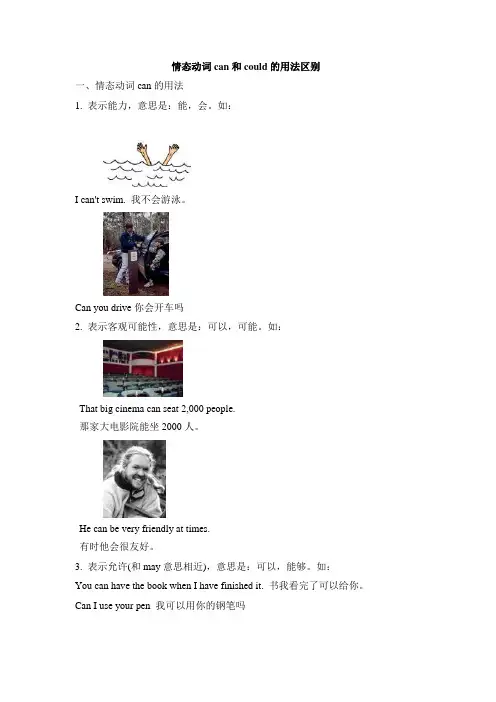
情态动词can和could的用法区别一、情态动词can的用法1. 表示能力,意思是:能,会。
如:I can't swim. 我不会游泳。
Can you drive你会开车吗2. 表示客观可能性,意思是:可以,可能。
如:That big cinema can seat 2,000 people.那家大电影院能坐2000人。
He can be very friendly at times.有时他会很友好。
3. 表示允许(和may意思相近),意思是:可以,能够。
如:You can have the book when I have finished it. 书我看完了可以给你。
Can I use your pen 我可以用你的钢笔吗4. 表示惊异、不相信等(用于疑问句、否定句或感叹句中),意思是:会,可能。
如:This can't be true. 这不可能是真的。
Can it be true 这可能是真的吗二、情态动词could的用法1. 表示“能力”或“可能性”,作为can的过去形式。
如:Could you speak English then 那时你能讲英语吗He said he couldn't follow me.他说他跟不上我。
2. 表示惊异、怀疑、不相信等情绪。
如:Who could have taken them 谁会把它们拿走了呢She couldn't have left so soon. 她不可能这么快就走了。
在这种情况下,could和can是可以换用的,用could时口气较缓和,用can时不相信的程度更强一些,两者在时间上没有差别。
3. 比较委婉客气地提出问题或陈述看法。
如:—Could you let me have your passport—Yes, here it is.—看看你的护照好吗—行,这就是。
I could come earlier, if necessary. 如果必要我可以早点来。
情态动词can(could)的用法
情态动词can (could)的用法情态动词定义:表示说话人的情感态度语气,有一定的意义;但没有人称和数的变化,和动词原形一起构成谓语,不能单独作谓语半篇文章将讲解情态动词can 的用法一.can-could (过去式)could 是can的过去式,也可表示更加委婉客气的语气二.用法用法一表示能力,意为“能,会”eg:Jim can swim. 吉姆会游泳Susan could sing an English song at the age of five.苏珊在她5岁的时候就会唱英文歌了。
I can’t dance.用法二疑问句中表示请求意为“可以”eg:Could you give me a hand?请你帮助我一下好吗?Could you please take the dog for a walk?请你带狗去散步好吗?用法三否定句、疑问句中表示可能性推测can “可能”can’t 不可能eg:The girl can’t be Susan. She is reading in the library.The door is open. Jim could forget it.Can he be at home?他可能在家吗?用法四表示建议或许可意为“可以”eg:You can go out 你可以出去了。
You could buy a schoolbag for your brother .你可以给你弟弟买一个书包。
三.句型肯定句型:主语+can/could +动词原形+其他eg:He can draw a picture.否定句型:主语+can/could+not +动词原形+其他eg:He can’t speak Chinese well.一般疑问句型:Can/Could +主语+动词原形+其他?eg:Can he speak Chinese well?肯定回答:Yes,he can.否定回答:No,he can’t.特殊疑问句型:特殊疑问词+can +主语+动词原形+其他?eg:What can I do for you?四.can 与be able to 的辨析1.表示能力时,二者通用eg:Jim can swim = Jim is able to swim.2.can 只用于现在时过去时(could);be able to 用于各种时态eg:Jim could swim at the age of 5.=Jim was able to swim at the age of 5.Jim will be able to ride a bicycle to school.五.固定搭配can’t help doing sth 忍不住做某事can’t stop doing sth 不能停止做某事can’t stand doing sth 无法忍受做某事六.could 表示更加委婉客气的请求1.委婉请求别人做某事(提出请求)句型:Could you (please) do sth? /Could you please not do sth?肯定回答:Yes,I can. /Sure./Certainly./Of course I can,/No problem.否定回答:Sorry,I can’t+原因/I’m afraid I can’t+原因eg:Could you please take the bag to the living room?Yes,sure.2.委婉请求别人允许自己做某事(征求许可)句型:Could I do sth?肯定回答:Yes,you can./Yes, please.否定回答:No,you can’t/I’m afraid you can’teg:Could I play with my best friend?I’m afraid you can’t.You have too much homework to do.。
情态动词can和could的用法
情态动词can和could主要用来表示能力,可能性许可征求对方意见的。
can 和could的用法主要有以下5条。
一、表示能力can表示有能力做,知道如何做或能够发生,意思是能,会。
could表示过去的能力。
The little baby can dress itself now.小宝宝可以给自己穿衣服了。
The girl could easily tell her mother's step,那个女孩很容易地判断出她妈妈的脚步声。
Mozart could play the piano at the age of three.莫扎特在三岁时就会弹钢琴了。
*用法比较:can与be able to的区别。
1.看只能在一般现在时与一般过去时两种时态中,be able to则可用于更多的时态。
I'm sorry,I haven't been able to answer your letter in time.真对不起,我能及时的给你回信。
2.Be able to后的动词一般不用被动形式而can则可以用被动形式。
The war can be painted.这个墙可以涂鸦了。
3.在过去时态中could仅只具备某种能力,但实施的结果不明确,而was/ were /were able to不仅说明有某种能力,而且还成功地做到了,相当于managedI talked with the boy for a long time and eventually I was able to make him believe me.我和那个男孩谈了很久,最终还是让他相信了我的话。
二、表示可能性1.用在肯定句中,表示理论上的可能性,指常有的行为或情形,意思是有时会……。
Tom can be really annoying.他们有时的确令人讨厌。
It can be very hot here in summer.这里夏天有时会很热。
情态动词can和could用法详解
情态动词can和could 用法详解can 和 could 用法详解1. 表示能力,could 是 can 的过去;如:Can you speak English 你会说英语吗Could you speak English then 那时候你会说英语吗2. 表示许可,注意以下用法:1 对于现在或将来的“许可”,要区分以下两种情况:a. 表示请求允许即请求别人允许自己做某事,可用 can=may或 could=might注意:这里的 could 并不表示过去,而是表示现在,只是语气较委婉;如:Can May, Could, Might I come in 我可以进来吗b. 表示给予允许即自己允许别人做某事,一般只用 can=may,而不能用 could 或 might;如:A: Could Can I use your pen 我可以借用你的钢笔吗B: Yes, of course you can. 当然可以;注意: 此处不用 Yes,you could2 对于过去的“许可”,也要区分以下两种情况:a. 表示过去一般性允许即表示某人随时都可以做某事,用 can的过去式即 could;如:When I lived at home, I could watch TV whenever I wantedto. 我住在家里时,想什么时候看电影就可以什么时候看一般性允许;b. 表示过去特定的允许即表示在过去某一特定情况下允许进行某一活动,则不用 could, 而需换成其它表达如:had permission或 was were allowed to;如:I was allowed to see the film yesterday evening. 昨天晚上允许我去看了电影特定的允许,所以不能用 could;3. 表示推测:1 对现在或将来的推测,can 通常只用于否定句或疑问句中,一般不用于肯定句:It can’t be true. 那不可能是真的;What can they be doing 他们会在干什么呢Can it be Jim 那会是吉姆吗但 could可以表示现在则可用于肯定句中:We could may, might go to Guilin this summer. 今年夏天我们可能要去桂林;将来可能性You could may, might be right, but I don’t think you are. 你可能是对的,但我并不认为你是对的;现在可能性注意:can 有时也用于肯定句中表示推测,这主要见于:a. 表示理论上的可能性即从理论上或逻辑上分析是可能的,但实际未必会发生;如:Anybody who wants to can become a prison visitor. 只要愿意,任何人都可以到监狱去帮助解决犯人的困难;Mary is in poor health. She can be ill at any time. 玛丽的身体不好,她随时都可能会生病; Evem experienced teachers can make mistakes. 即使是有经验的教师也可能出错;b. 后接“be, get, seem, become+形容词”,表示“有时会”、“时常会”等义;如:It can get very hot here. 这里有时会很热;She can be very unpleasant. 她有时很令人讨厌;My grandmother could be very unpleasant at times. 我祖母有时候会让人非常不愉快;2 对过去的推测,必须在 can, could 之后接动词的完成式:a. can+have+过去分词主要用于否定句或疑问句,一般不用于肯定句;如:I saw him just now;he can’t have gone to Japan. 我刚刚见过他,他不可能到日本去了;Why does he know this Can someone have told him about it 他怎么知道会是哪个人告诉他了吗b. could+have+过去分词可用于肯定句、否定句或疑问句,主要用于:①表示对过去的推测,其意为“可能已经……”;如:He could have gone home. 他可能已回家了;Where could he have gone 他会到哪里去了呢He couldn’t have seen her there. 他不可能在那儿见到她;②表示过去没有实现的可能性即某事本来可以发生,但却没有发生,意为“本来可以……”;如:He could have told her, but he didn’t choose to. 他本来可以告诉她的,但他没有这样做;③用来委婉地责备某人过去应该做某事而没有去做,意为“本来应该……”;如:You could have helped him. 你本来应该来帮助他的;④表示“差点儿就要”;如:I could have died laughing. 我差点儿笑死了;。
考研语法小知识:情态动词can和could
can/could作为情态动词时,有5种意思,同时对应用种用法,具体如下:
情态动词
用法
例句
can/could
表示能力
I could carry ten-kilogram-weigh rice, but I cannot now.过去我能扛动10千克的大米,但是现在不行了。
在肯定句中,表示客观可能性,并不涉及具体某事会发生,常用来说明人或事物的特征。
要表达具体某事实际发生的可能性时,不用can,需用could,may,might。
Tom may stay at home this afternoon.汤姆今天下午可能待在家里。
表示请求和允许。
表示请求,口语中常用could代替can,使语气更委婉。
In soccer, you can’t touch the ball with your hands.足球比赛中,你不能用手碰球。
表示对现在的动作或状态进行主观的猜测,主要用在否定句和疑问句中。
Can the man over there be our mater?在那边的男人是我们校长吗?
表示惊异、怀疑、不相信等态度,主要用在否定句、疑问句和感叹句中。
How can you be so crazy!你怎么会如此疯狂!。
- 1、下载文档前请自行甄别文档内容的完整性,平台不提供额外的编辑、内容补充、找答案等附加服务。
- 2、"仅部分预览"的文档,不可在线预览部分如存在完整性等问题,可反馈申请退款(可完整预览的文档不适用该条件!)。
- 3、如文档侵犯您的权益,请联系客服反馈,我们会尽快为您处理(人工客服工作时间:9:00-18:30)。
情态动词can和could 用法详解
can 和 could 用法详解
1. 表示能力,could 是 can 的过去。
如:
Can you speak English? 你会说英语吗?
Could you speak English then? 那时候你会说英语吗?
2. 表示许可,注意以下用法:
(1) 对于现在或将来的“许可”,要区分以下两种情况:
a. 表示请求允许(即请求别人允许自己做某事),可用 can(=may)或 could(=might)(注意:这里的 could 并不表示过去,而是表示现在,只是语气较委婉)。
如:
Can [May, Could, Might] I come in? 我可以进来吗?
b. 表示给予允许(即自己允许别人做某事),一般只用 can(=may),
而不能用 could 或 might。
如:
A: Could [Can] I use your pen? 我可以借用你的钢笔吗?
B: Yes, of course you can. 当然可以。
(注意: 此处不用 Yes,
you could)
(2) 对于过去的“许可”,也要区分以下两种情况:
a. 表示过去一般性允许(即表示某人随时都可以做某事),用 can的过去式(即 could)。
如:When I lived at home, I could watch TV whenever I wanted
to. 我住在家里时,想什么时候看电影就可以什么时候看 (一般性允许)。
b. 表示过去特定的允许( 即表示在过去某一特定情况下允许进行某一活动),则不用 could, 而需换成其它表达(如:had permission或 was [were] allowed to)。
如:
I was allowed to see the film yesterday evening. 昨天晚上允许我去看了电影(特定的允许,所以不能用 could)。
3. 表示推测:
(1) 对现在或将来的推测,can 通常只用于否定句或疑问句中,一般不用于肯定句:
It can’t be true. 那不可能是真的。
What can they be doing? 他们会在干什么呢?
Can it be Jim? 那会是吉姆吗?
但 could(可以表示现在)则可用于肯定句中:
We could [may, might] go to Guilin this summer. 今年夏天我们可能要去桂林。
(将来可能性)
You could [may, might] be right, but I don’t think you are. 你可能是对的,但我
并不认为你是对的。
(现在可能性)
注意:can 有时也用于肯定句中表示推测,这主要见于:
a. 表示理论上的可能性(即从理论上或逻辑上分析是可能的,但实际未必会发生)。
如:Anybody who wants to can become a prison visitor. 只要愿意,任何人都可以到监狱去帮助解决犯人的困难。
Mary is in poor health. She can be ill at any time. 玛丽的身体不好,她随时都可能会生病。
Evem experienced teachers can make mistakes. 即使是有经验的教师也可能出错。
b. 后接“be, get, seem, become+形容词”,表示“有时会”、“时常会”等义。
如:
It can get very hot here. 这里有时会很热。
She can be very unpleasant. 她有时很令人讨厌。
My grandmother could be very unpleasant at times. 我祖母有时候会让人非常不愉快。
(2) 对过去的推测,必须在 can, could 之后接动词的完成式:
a. can+have+过去分词(主要用于否定句或疑问句,一般不用于肯定句)。
如:
I saw him just now;he can’t have gone to Japan. 我刚刚见过他,他不可能到日本去了。
Why does he know this? Can someone have told him about it? 他怎么知道? 会是哪个人告诉他了吗?
b. could+have+过去分词(可用于肯定句、否定句或疑问句),主要用于:
①表示对过去的推测,其意为“可能(已经)……”。
如:
He could have gone home. 他可能已回家了。
Where could he have gone? 他会到哪里去了呢?
He couldn’t have seen her there. 他不可能在那儿见到她。
②表示过去没有实现的可能性(即某事本来可以发生,但却没有发生),意为“本来可以……”。
如:
He could have told her, but he didn’t choose to. 他本来可以告诉她的,但他没有这样做。
③用来委婉地责备某人过去应该做某事而没有去做,意为“本来应该……”。
如:
You could have helped him. 你本来应该来帮助他的。
④表示“差点儿就要”。
如:
I could have died laughing. 我差点儿笑死了。
